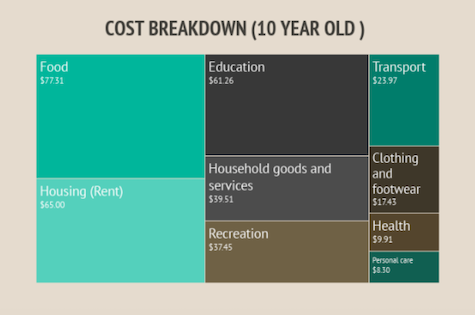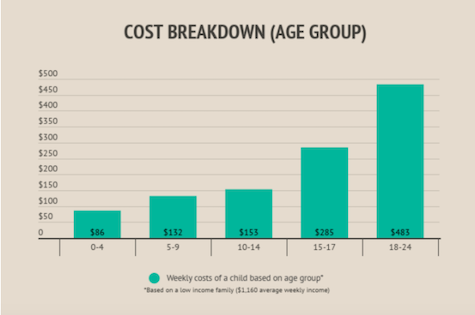As any parent will tell you, raising a child is expensive. While essential living expenses like food, housing and school bills make up a significant portion of the costs, there are other factors you have to consider as well.
If you work, you might also have to factor in opportunity cost – that is, the income you’ll lose out on when you take time off to raise your newborn.
So how much does it cost to raise children in Australia? Well it’s a combination of two things: your essential costs and the opportunity cost of leaving the workplace.

Essential costs
So let’s look at the obvious expenses first. According to the stats, food, housing and education each account for between 18% and 22% of monthly childcare budgets. For all the essentials, you’re looking at a weekly amount of $203.47. Put that all together and the average cost of raising a child to the age of 17 is $297,700.
Having kids is probably going to require some sacrifices. To keep the costs down, you might find yourself bargain hunting a little more and spending less on yourself. As Natalie Chan, founder of Motherpedia, says, “We travel less, dine out less frequently and even find more joy in finding bargains from Kmart than shopping in the branded outlets.”
Education costs
Keep in mind though that these stats are an average. Costs can vary massively depending on the school you send your child to. For example, if you send your child to a private school, you can expect to pay around $490,000 which covers their education from preschool to year 12. A catholic school, on the other hand, is around half as much at $240,000. Public school is significantly less again and usually costs you around $70,000.
Costs go up with age
Generally speaking, the older our kids get, the more expensive they become.

Based on a low income family, you’re looking at a massive $396 difference in weekly cost between the ages of 0-4 and 18-24. Pocket money, social events and transport costs are among the many reasons that it can become so much more expensive as our children get older.
Opportunity cost of leaving the workforce
Budgeting for things like food and education are obvious but calculating the opportunity cost of having children can be a little harder. However, if you plan to take time off work to raise your newborn, your income is likely to be affected.
Natalie Chan says she had to "take a hit with income” in order to care for her second born by becoming a part-time work-from-home mother. As a result, "with the loss of dual income, we have given up the financial freedom to retire early".
The stats highlight just how much you could lose out on. According to the Australian Bureau of Statistics (ABS), the average annual income for a female in Australia is $77,246. That means if you have three years of leave, like I did (including paid maternity leave) before getting back to the workforce, you could be missing out on $154,492. When you add that to your essential living expenses, the average total cost of raising a child is $452,192.
But it’s all worth it
Even with all the costs and concerns that come with raising a family, the majority of us still wouldn’t change it for the world. It might hinder our career and eat into our retirement pot but it can also be the most rewarding experience of our lives.
As CEO and Motherpedia founder sums up, “it's all worth it, and I am willing to do it all over again, anytime!”
Bessie Hassan is a mum and Finder’s money expert.








 Agree (0)
Agree (0) Disagree (
Disagree (__small.png)
__small.png)








__small.png)










